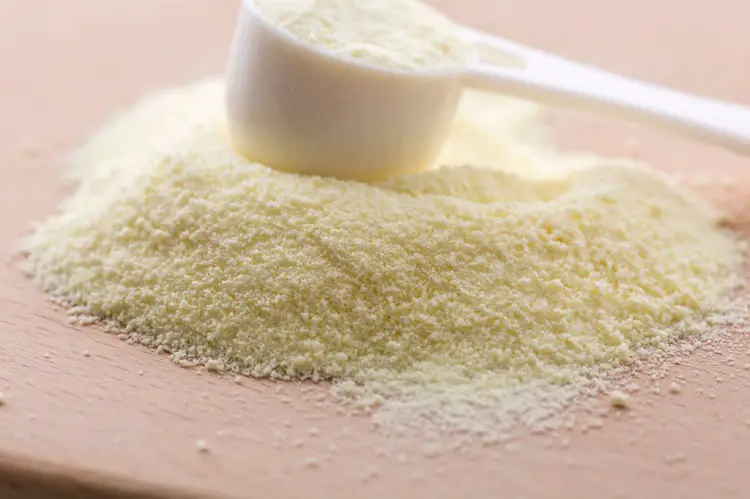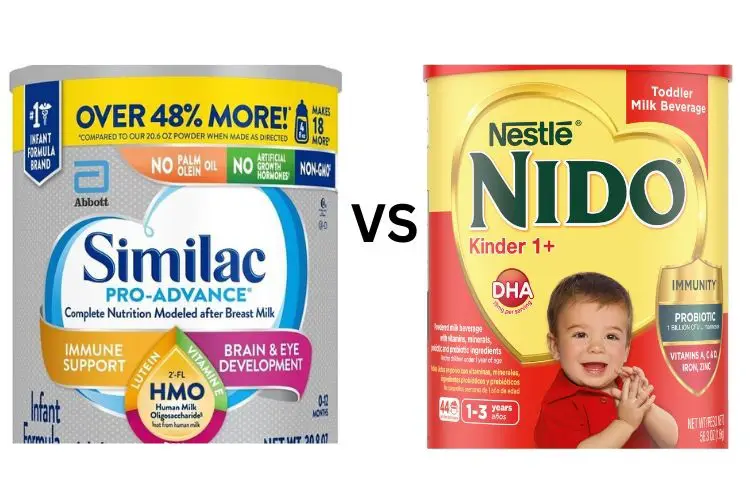Some parents often wonder if it’s possible to replace infant formula with powdered milk like Similac Vs Nido.
While you should not replace formula or breast milk with powdered milk, you can infuse powdered milk into some of your kid’s meals to increase their nutritional value.
This comparison between Similac Vs Nido exposes why you should not replace infant formula with milk.
Similac Vs Nido: Baby Formula Comparision

Similac
Similac formula is formulated to provide essential nutrients to a baby’s growth and development.
The brand offers a variety of products such as Similac Advance, Similac Pro-advance, Similac Sensitive, and more, and each of these variants meets specific needs.
Similac is a famous brand of powdered milk produced by Abbott Laboratories. It offers a line of formulas designed to meet the nutritional needs of babies from birth to all stages of development.
These formulas are intended to be used as a breast milk substitute when breastfeeding is not possible or to supplement breast milk if necessary.
Pros
Recipes for Different Stages:
Similac offers a wide selection of different formulas to meet your baby’s different stages of growth and development, including infants and toddlers.
Each formula is specifically designed to provide the nutrients needed by a specific age group.
Special Formula:
Similac also manufactures special formulations to meet specific dietary needs, such as formulas for infants with lactose intolerance, milk allergies, or infants with specific medical conditions.
Nutrient Content:
Similac formula is carefully designed to provide essential nutrients, including proteins, carbohydrates, fats, vitamins, and minerals in proportions appropriate for the growth of infants.
Convenience:
Similac formula is convenient to use and is usually available in liquid or powder form, allowing parents to choose the one that best suits their needs.
Quality Assurance:
Abbott laboratories adhere to strict quality and safety standards during the production of infant formulas, ensuring that they meet regulatory guidelines.
Cons
- Not equivalent to breast milk
- It requires proper preparation and sterilization which can be time-consuming and may lead to infection if not properly done
- Risk of allergic fraction.
- Digestibility; not all babies can tolerate formula equally.
Nido
Nido milk is a popular choice among parents who wish to provide their children with essential nutrients needed for growth and development.
Like many other food products, Nido milk has its own advantages and disadvantages that need to be weighed before including it in your child’s diet.
It is packed with many vitamins and minerals like calcium, Vitamin D, and iron for strong teeth and bones and healthy blood cells.
Also, Nido powdered milk can be stored for a long time without getting spoiled which makes it a convenient choice for parents in terms of storage and cutting costs.
However, everything with an advantage has a disadvantage, hence, Nido also has its cons which is important for you to consider before deciding.
Pros
Nido, often associated with the Nestle dairy product line, is a brand that offers a variety of benefits and features that can appeal to consumers.
Some of the benefits or pros of Nido milk powder and related products include:
Nutritional Content:
Nido products are fortified with essential vitamins and minerals, making them a good source of nutrition.
They are often marketed as a good source of calcium, Vitamin D, and other nutrients important for growth and development.
Long Shelf Life:
Nido milk powder has a long shelf life, which means, it can be stored for a long time without spoiling.
This can be convenient for households, especially in areas where fresh milk is not readily available.
Convenience:
Nido milk powder can be easily mixed with water, making it a convenient choice for those who do not have access to fresh milk or prefer the convenience of powdered milk products.
Flexibility:
Nido milk powder can be used in a variety of recipes and applications, including beverages, baking, and cooking ingredients. Its versatility makes it a pantry staple.
Potential Savings:
In some cases, powdered milk products such as NIdo can be more profitable than buying raw milk, especially in areas where raw milk product prices are high.
Dietary Considerations:
Nido offers options like Nido Fortificada, which are fortified with additional nutrients, and suitable for people with specific dietary needs or those looking to supplement their diet.
Availability:
Nestle’s Nido products are widely available in many parts of the world, making them accessible to many consumers.
Full and Intense Flavor:
The highly rich taste of Nido milk powder is appealing to children’s palates, helping them enjoy more milk and get the nutrients they need.
Cons
While Nido milk powder and related products offer some benefits, they also have some potential downsides and limitations that consumers should be aware of.
Here are some disadvantages associated with Nido:
Additional Sugar:
Some Nido products contain added sugars, which can contribute to increased calorie intake and potential health problems such as obesity and dental problems.
It is important to check product labels for information on sugar content.
The Treatment:
Like many powdered milk products, Nido undergoes a processing method that includes heating and drying.
This process can strip away nutrients and potentially change the taste and texture of milk.
Allergens:
Nido dairy products may contain allergens such as milk proteins. People with lactose intolerance or a milk allergy should exercise caution and check product labels for allergen information.
Environmental Impact:
The production and packaging of powdered dairy products can cause environmental impacts, including energy consumption, greenhouse gas emissions, and packaging waste.
Opting for locally sourced fresh milk may be a more sustainable choice for some consumers.
Flavors and Textures:
Some consumers find reconstituted milk powder products like Nido to not have the same taste and texture as raw milk.
This can be a personal preference and some people may not like its taste or consistency.
Value:
While powdered milk products may be profitable in some regions, the prices of Nido and similar products can remain relatively high compared to other options, especially in low-income areas.
Limited Varieties:
Availability of Nido products may vary by region and flavor or formulation options may be limited, which may not satisfy all consumers’ preferences or dietary needs.
Pack Size:
Nido milk powder is often presented in larger packages, which may not be suitable for individuals or small households, potentially posing a risk of waste if the product is not used quickly.
Variants of Nido
Nido offers a range of variants of products to meet the different dietary needs of every kid. Here are some of the popular products available in stores:
- Nido 1+
- Nido Lacto-Ease
- Nido 3+
- Nido Fortificada
Nido 1+
This is a specially formulated milk for kids between the ages of 1-3 years.
It is rich in probiotics, 19 mg of Omega-3 DHA, and as many as 13 vitamins and minerals to help support the growth and development and a healthy immune system in kids.
It is specifically designed to provide your child, 1 year of age and older, with lots of essential vitamins and minerals to support their growth journey.
The likes of Vitamins A, C, D, B6, K, E, Calcium, Iron, Niacin, Pantothenic Acid, Thiamine, Selenium, and Zinc.
As a dairy product, Nido 1+ contains ingredients of animal origin like milk. Vitamin D3 comes from lanolin which can be gotten from either fish or sheep.
However, the nutritional supplements are synthetic.
Nido Lacto-Ease
This variant is almost like the Nido 1+, it is a milk drink for 1-3-year-olds that offers all the same benefits as Nido 1+.
The difference is, that it has a reduced lactose content, making it suitable for kids who are lactose intolerant.
Nido 3+
Nido 3+ is a variant of Nido powdered milk fortified with 12 vitamins and minerals to support a child’s healthy growth during kindergarten.
Nido Fortificada
Nido Fortificada is a powdered whole milk drink fortified with vitamin C and iron for healthy growth and development. It is only suitable for older children and adults, and not babies.
Related Posts:
Can Nido Milk Replace Breast Milk Or Infant Formula?
Nido milk and similar products cannot replace breast milk or infant formula.
Breast milk is the best source of nutrition for babies as it provides essential nutrients, antibodies, and other components that support the growth and development of the baby’s immune system.
If breastfeeding is not possible, infant formula specifically designed for infants is a recommended alternative.
Here are reasons Nido should not be used as a substitute for breast milk or formula:
Lack of essential nutrients:
Nido infant formula is not formulated to meet the special needs of infants. It lacks essential nutrients and fatty acids for infant growth development.
Digestibility:
Infant formula is carefully designed to be easy to digest and provide balanced nutrition. Nido milk, which is not specially formulated for babies, can be more difficult to digest for a baby’s immature digestive system.
Risk of an allergic reaction:
Newborns are at risk for allergies to certain proteins, especially cow’s milk proteins. Nido milk contains cow’s milk protein, which can cause allergies in some babies.
Hydration:
Newborns rely primarily on breastmilk or formula for hydration. Nido milk when mixed with water may not provide the required amount of water infants need.
Regulation guide:
Infant formula is administered and follows strict quality and safety standards to ensure the nutritional needs of infants are met. Nido milk does not meet these standards and is not intended for infants.
Conclusion
It is important to prioritize the health and well-being of infants and young children as advised by healthcare professionals.
If you are unable to breastfeed, consult your pediatrician to determine the right formula for your baby’s needs.
Using products like Nido milk to replace breast milk or infant formula can pose health risks and should be avoided in infants.
